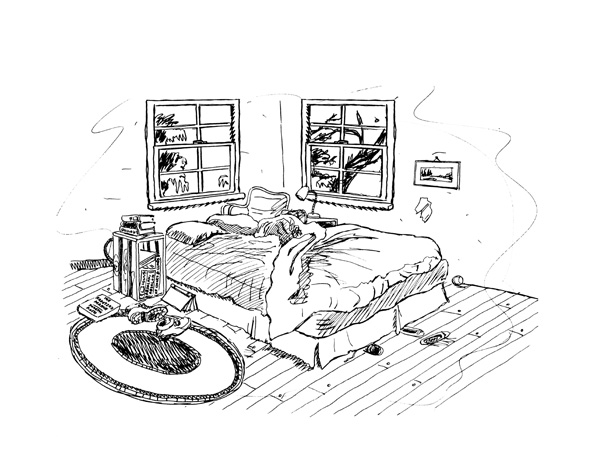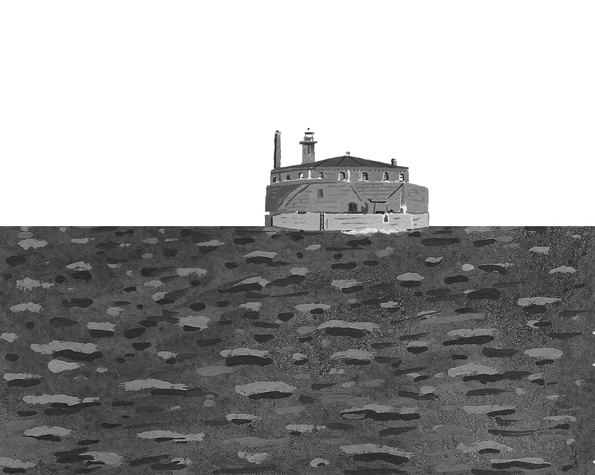The Art of Love and Shame and Love

For a while now, I’ve been meaning to say something about Peter Orner‘s novel Love and Shame and Love, and not just about what a great read it is. I’d noticed the beautiful illustrations, starting with the cover art, as soon as I picked the book up, but it wasn’t until I asked Orner about them directly that I realized he’s the brother of Eric Orner, the indie artist best known for his syndicated comic strip, The Mostly Unfabulous Social Life of Ethan Green.
“My whole life I’ve pretty much been in awe of what [Eric] is able to do with his pen,” Orner emailed me. “In some ways maybe my writing stories is a response what he does and I can’t do, which is make human beings and situations so alive on the page. With [Love and Shame and Love], though, I asked him specifically to not do people. I wanted there to be a certain starkness. When I think of where I’m from, Chicago, the midwest, I always think of the Lake Michigan in November, and the bare trees, and I asked Eric to capture this idea. Even when he wasn’t doing landscapes though, like his drawing of the bed, early in the book, his drawings really get to the heart of what the book is about, which is loss, trying to hold on to what is already gone by telling stories about it.”
“Because my brother and I have a kind of shared memories,” Orner adds, “he and I know things that no one else on the planet know… [So] I could say, ‘Hey, Eric, can you draw me a picture of that pizza place I got fired from when I was sixteen?’ and he could do it, without any questions. Same with the water crib drawing, which is probably my favorite. Those water cribs, these buildings that seem, when you are standing on the beach, to be floating on the surface of Lake Michigan—my brother, sitting in his studio in LA, was able to conjure them up exactly how they looked to us as kids.”

“Working with him was a great gift,” Orner concluded. “I only wish he got paid what those drawings were worth! He did it as a favor to me… But I’m his brother. What choice did he have?” Well, any of us who read Love and Shame and Love are fortunate that Orner was able to get such wonderful illustrations at such a good rate.
27 March 2012 | uncategorized |
The Beatrice App: A Status Update
Recently, I announced plans to create an app version of Beatrice that will combine feature-length interviews with fiction and nonfiction writers and streaming video highlights from those conversations. I wanted to make the initial release of the app free, so I launched a Kickstarter campaign to raise enough funds to develop the app, get it into Apple’s App Store, and include at least three free interviews to start readers off. (After that, new interviews will be available in bundles of three or four for something like $1.99 or $2.99.)
I’m about halfway through the campaign, and so far, people have pledged nearly half of the requested funds. I’m grateful for the support that they’ve shown so far—as I told people on Twitter earlier today, I’m at a stage now where all it will take to make this campaign a success is 250 people deciding to pledge $10, and get ebooks full of advice from 50 great writers as a thank-you gift. (Or 125 people pledging $20 for advice from up to 75 writers…) I saw an article recently that said Kickstarter might raise more money than the NEA to support arts projects in 2012, and that’s pretty amazing.
It reinforces something I noticed in Tricia Tunstall’s Changing Lives, a fantastic book about LA Philharmonic conductor Gustavo Dudamel and El Sistema, the Venezuelan musical education program that helped nurture his talent from early childhood. There’s a lot of talk in the book about American efforts to duplicate the El Sistema model, and at one point, a seminar leader makes this observation: “We in the arts world are so marinated in scarcity thinking. It can seem inconceivable to us to reach for something as grand as El Sistema.”
The book world, I think, is equally susceptible to scarcity thinking, but what I’m learning is that if you believe in something like the Beatrice app passionately enough, you can convince other people your vision is worthy of their support. The resources are out there; you just have to commit yourself to creating the amazing thing you want to create.
 This campaign has also reminded me about the importance of the literary community, a lesson that I’ve been able to apply in what I hope will be a powerful way. You see, I learned about a newly opened independent bookstore in Salina, Kansas, called Ad Astra Books and Coffee that started to raise capital to expand its business through live events and a statewide marketing campaign, among other efforts. I pledged $10 to the store, but then I contacted William Justice, one of Ad Astra’s owners, and I made him an offer I’m delighted to say he accepted.
This campaign has also reminded me about the importance of the literary community, a lesson that I’ve been able to apply in what I hope will be a powerful way. You see, I learned about a newly opened independent bookstore in Salina, Kansas, called Ad Astra Books and Coffee that started to raise capital to expand its business through live events and a statewide marketing campaign, among other efforts. I pledged $10 to the store, but then I contacted William Justice, one of Ad Astra’s owners, and I made him an offer I’m delighted to say he accepted.
Here’s the deal: If I raise my $4,500 and Ad Astra raises its $15,000, I’m headed to Salina to emcee a multi-author event at Ad Astra later this year, plus I’ll interview the authors we line up for that event and publish those conversations in the Beatrice app for free. We’ll figure out the details when we need to, but I have a feeling this could be a really fantastic event, the kind of thing I’d eventually like to bring to bookstores and other literary centers across the country. Does that sound like something you’d like to see? If so, I hope you’ll support the Beatrice app now, and set the ball rolling. In essence, you’re not just supporting an app, you’re making it that much easier to sustain a thriving literary community that provides space both online and in the bricks-and-mortar world where we can celebrates awesome writers and their accomplishments.
6 March 2012 | uncategorized |

 Our Endless and Proper Work is my new book with Belt Publishing about starting (and sticking to) a productive writing practice.
Our Endless and Proper Work is my new book with Belt Publishing about starting (and sticking to) a productive writing practice. 
